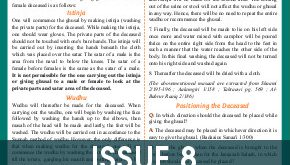There are Two Faraa’idh in Janaazah Salaah:
- To recite all the four Takbeers.
- To stand and perform the Janaazah Salaah if one is able.[1]
There are Three Sunnats in Janaazah Salaah:
- To read the Thana i.e. to praise Allah Ta’ala.
- To send salutations upon Rasulullah (sallallahu alaihi wasallam).
- To make dua for the deceased.[2]
Pertinent Masaa’il Pertaining to Janaazah Salaah
- In Janaazah Salaah, each takbeer is in place of one rakaat i.e. the position that each takbeer holds in a Janaazah Salaah is similar to the position that each rakaat holds in a four rakaat fardh salaah. Hence, if any takbeer is omitted, the Janaazah Salaah will be invalid.[3]
- Just as it is compulsory to perform the fardh salaah standing when one is able to, similarly it is compulsory to perform the Janaazah Salaah standing. Thus, if a person performs the Janaazah Salaah sitting without a valid excuse, the salaah will not be valid.
- There is no ruku’, sajdah or qa’dah in Janaazah Salaah. [4]
- There are two important differences between Janaazah Salaah and normal salaah.
a) The Janaazah Salaah is not limited to any specific time unlike the five daily salaah. Hence, at whichever time the janaazah is brought, the Janaazah Salaah can be performed. The Janaazah salaah can also be performed after Fajr and after Asr Salaah. However, one should refrain from performing the Janaazah Salaah during the forbidden times i.e. at the time of sunrise, zawaal or sunset. Sunset refers to the time when the colour of the sun begins to change before the actual sunset (i.e. including the actual sunset.) [5]
b) If a person (besides the wali of the deceased) does not have wudhu and fears that if he has to engage in making wudhu, he will miss the Janaazah Salaah, then in such a situation it will be permissible for him to make tayammum and perform the Janaazah Salaah, contrary to the five daily salaah.[6] In the case of the five daily salaah, even if one fears missing the salaah, it will not be permissible for one to perform tayammum and perform the salaah. Instead it is necessary for him to make wudhu and perform the salaah. If the time expires while he is making wudhu, then he should perform the salaah as qadha. [7]
عن ابن عباس قال إذا خفت أن تفوتك الجنازة وأنت على غير وضوء فتيمم وصل [8]
Hazrat Ibnu Abbaas (radhiyallahu anhuma) is reported to have said, “If you fear missing the Janaazah Salaah whilst you are not in the state of wudhu, then make tayammum and perform salaah.”
5. The takbeers and duas of the Janaazah Salaah will be read by both the imaam and the muqtadi. The only difference beween the imaam and muqtadi is that the imaam will make the takbeers and salaam aloud while the muqtadi will make them softly. The remainder portion of the salaah (i.e. the thanaa, Durood and dua) will be recited softly by the muqtadi as well as the imaam. [9]
6. It is mustahab to make at least three saffs for the Janaazah Salaah. Hence, if there are only seven people present for the Janaazah Salaah, it is mustahab for them to make three saffs in the following manner. One person will be made the imaam, three people will stand in the first saff, two people in the second saff, and one person in the third saff.[10]
عن مرثد بن عبد الله اليزني قال كان مالك بن هبيرة إذا صلى على جنازة فتقال الناس عليها جزاؤهم ثلاثة أجزاء ثم قال قال رسول الله صلى الله عليه و سلم من صلى عليه ثلاثة صفوف فقد أوجب [11]
Whenever Maalik bin Hubairah (radhiyallahu anhu) performed a Janaazah Salaah, he would split the congregation into three parts. He would then say that Rasulullah (sallallahu alaihi wasallam) said, “The janaazah upon whom three saffs of people performed salaah earns Jannah”.
7. Those factors that invalidate normal salaah invalidate Janaazah Salaah. [12] In regard to factors that invalidate the salaah, the only two differences between normal salaah and Janaazah Salaah are:
a) If one laughs aloud in normal salaah, the salaah as well as the wudhu will be invalidated. However, if one laughs aloud in Janaazah Salaah, only the salaah will be invalidated. The wudhu will not be invalidated. [13]
b) If a woman stands next to a man in normal salaah, the salaah of the man breaks. In Janaazah Salaah, if a woman stands next to a man, his salaah does not break.[12]
8)If the imaam makes more than four takbeers in the Janaazah Salaah, it is not permissible for the muqtadis to follow him. Instead, they should remain silent and complete the salaah when the imaam makes salaam. However, if they do not hear the extra takbeers from the imaam, but from the mukabbir (the person who says the takbeer in a loud voice in order for others to hear), then the muqtadis should follow the mukabbir in the extra takbeers since they do not know which is the takbeer of the imaam. [14]
[1] ( وركنها ) شيئان ( التكبيرات ) الأربع فالأولى ركن أيضا لا شرط فلذا لم يجز بناء أخرى عليها ( والقيام ) فلم تجز قاعدا بلا عذر قال الشامي : قوله ( فلم تجز قاعدا ) أي ولا راكبا قوله ( بلا عذر ) فلو تعذر النزول لطين أو مطر جازت راكبا ولو كان الولي مريضا فصلى قاعدا والناس قياما أجزأهم عندهما وقال محمد تجزي الإمام فقط حلية (رد المحتار 2/209)
[2] ( وسنتها ) ثلاثة ( التحميد والثناء والدعاء فيها ) ذكره الزاهدي قال الشامي : قوله ( التحميد والثناء ) كذا في البحر عن المحيط ومقتضى قول الشارح ثلاثة أن الثناء غير التحميد مع أنه فيما يأتي فسر الثناء بقوله سبحانك اللهم وبحمدك فعلم أن المراد بهما واحد على ما يأتي بيانه فكان عليه أن يذكر الثالث الصلاة على النبي صلى الله عليه وسلم (رد المحتار 2/209)
[3] وركنها التكبيرات والقيام لأن كل تكبيرة منها قائمة مقام ركعة (البحر الرائق 2/183)
وصلاة الجنازة أربع تكبيرات ولو ترك واحدة منها لم تجز صلاته هكذا في الكافي (الفتاوى الهندية 1/164)
[4] قال الشامي : قوله ( ينوي الصلاة لله الخ ) كذا في المنية قال في الحلية وفي المحيط الرضوي والتحفة والبدائع ينبغي أن ينوي صلاة الجمعة وصلاة العيدين وصلاة الجنازة وصلاة الوتر لأن التعيين يحصل بهذا اهـ وأما ما ذكره المصنف فليس بضربة لازب ويمكن أن يكون إشارة إلى أنه لا ينوي الدعاء للميت فقط نظرا إلى أنه لا ركوع فيها ولا سجود ولا قراءة ولا تشهد اهـ (رد المحتار 1/423)
[5] فصل وأما بيان ما يكره فيها فنقول تكره الصلاة على الجنازة عند طلوع الشمس وغروبها ونصف النهار لما روينا من حديث عقبة بن عامر أنه قال ثلاث ساعات نهانا رسول الله صلى الله عليه وسلم أن نصلي فيها وأن نقبر فيها موتانا والمراد من قوله أن نقبر فيها موتانا الصلاة على الجنازة دون الدفن إذ لا بأس بالدفن في هذه الأوقات فإن صلوا في أحد هذه الأوقات لم يكن عليهم إعادتها لأن صلاة الجنازة لا يتعين لأدائها وقت ففي أي وقت صليت وقعت أداء لا قضاء ومعنى الكراهة في هذه الأوقات يمنع جواز القضاء فيها دون الأداء كما إذا أدى عصر يومه عند تغير الشمس على ما ذكرنا فيما تقدم ولا تكره الصلاة على الجنازة بعد صلاة الفجر وبعد صلاة العصر قبل تغير الشمس لأن الكراهة في هذه الأوقات ليست لمعنى في الوقت فلا يظهر في حق الفرائض لما بينا فيما تقدم ولو أرادوا أن يصلوا على جنازة وقد غربت الشمس فالأفضل أن يبدؤا بصلاة المغرب ثم يصلون على الجنازة لأن المغرب آكد من صلاة الجنازة فكان تقديمه أولى ولأن في تقديم الجنازة تأخير المغرب وأنه مكروه (بدائع الصنائع 1/316)
[6] قوله (وخوف فوت صلاة جنازة) أي يجوز التيمم لخوف فوت صلاة الجنازة (البحر الرائق 1/65)
[7] ) من عجز ( مبتدأ خبره تيمم ) عن استعمال الماء ( المطلق الكافي لطهارته لصلاة تفوت إلى خلف ) لبعده … ميلا … أو لمرض … أو برد … أو خوف عدو … أو عطش … أو عدم آلة … تيمم ( قال الشامي : قوله ) تفوت إلى خلف ( كالصلوات الخمس فإن خلفها قضاؤها وكالجمعة فإن خلفها الظهر واحترز به عما لا يفوت إلى خلف كصلاة الجنازة والعيد والكسوف والسنن والرواتب فلا يشترط لها العجز كما سيأتي قوله (لبعده) … لأنه عند عدمه لا يتيمم وإن خاف خروج الوقت في صلاة لها خلف (رد المحتار 1/232-236)
[8] مصنف ابن أبي شيبة، الرقم: 11586
[9] ( ويسلم ) بلا دعاء ( بعد الرابعة ) تسليمتين ناويا الميت مع القوم ويسر الكل إلا التكبير زيلعي وغيره لكن في البدائع العمل في زماننا على الجهر بالتسليم وفي جواهر الفتاوى يجهر بواحدة قال الشامي : قوله ( لكن في البدائع الخ ) قد يقال إن الزيلعي لم يرد دخول التسليم في الكلية المذكورة والذي في البدائع ولا يجهر بما يقرأ عقب كل تكبيرة لأنه ذكر والسنة فيه المخافتة وهل يرفع صوته بالتسليم لم يتعرض له في ظاهر الرواية وذكر الحسن بن زياد أنه لا يرفع لأنه للإعلام ولا حاجة له لأن التسليم مشروع عقب التكبير بلا فصل ولكن العمل في زماننا على خلافه اهـ (رد المحتار2/213)
[10] وأفضل صفوفها آخرها إظهارا للتواضع قال الشامي : قوله ( وأفضل صفوفها آخرها الخ ) كذا في القنية وبحث فيه في الحلية بإطلاق ما في صحيح مسلم عنه خير صفوف الرجال أولها وشرها آخرها وبأن إظهار التواضع لا يتوقف على التأخر اهـ أقول قد يقال إن الحديث مخصوص بالصلاة المطلقة لأنها المتبادرة ولقوله من صلى عليه ثلاثة صفوف غفر له رواه أبو داود وقال حديث حسن والحاكم وقال صحيح على شرط مسلم ولهذا قال في المحيط ويستحب أن يصف ثلاثة صفوف حتى لو كانوا سبعة يتقدم أحدهم للإمامة ويقف وراءه ثلاثة ثم اثنان ثم واحدا اهـ فلو كان الصف الأول أفضل في الجنازة أيضا لكان الأفضل جعلهم صفا واحدا ولكره قيام الواحد وحده كما كره في غيرها هذا ما ظهر لي (رد المحتار 2/214) انظر أيضا فتاوى محمودية (13/204)
[11] جامع الترمذي، الرقم: 1028
[12] وتفسد صلاة الجنازة بما تفسد به سائر الصلوات إلا محاذاة المرأة كذا في الزاهدي (الفتاوى الهندية 1/164)
[13] فلا تنقض القهقهة في صلاة الجنازة وسجدة التلاوة لكن يبطلان (البحر الرائق 1/43)
[14] ( فلو كبر الإمام خمسا لم يتبع ) لأنه منسوخ ولا متابعة فيه ولم يبين ماذا يصنع وعن أبي حنيفة روايتان في رواية يسلم للحال ولا ينتظر تحقيقا للمخالفة وفي رواية يمكث حتى يسلم معه إذا سلم ليكون متابعا فيما تجب فيه المتابعة وبه يفتي كذا في الواقعات ورجحه في فتح القدير بأن البقاء في حرمة الصلاة بعد فراغها ليس بخطأ مطلقا إنما الخطأ في المتابعة في الخامسة وفي بعض المواضع إنما لا يتابعه في الزوائد على الأربعة إذا سمع من الإمام أما إذا لم يسمع إلا من المبلغ فيتابعه وهذا حسن وهو قياس ما ذكروه في تكبيرات العيدين اهـ (البحر الرائق 2/198)
 Ihyaaud Deen An Effort to Revive Deen in Totality
Ihyaaud Deen An Effort to Revive Deen in Totality

